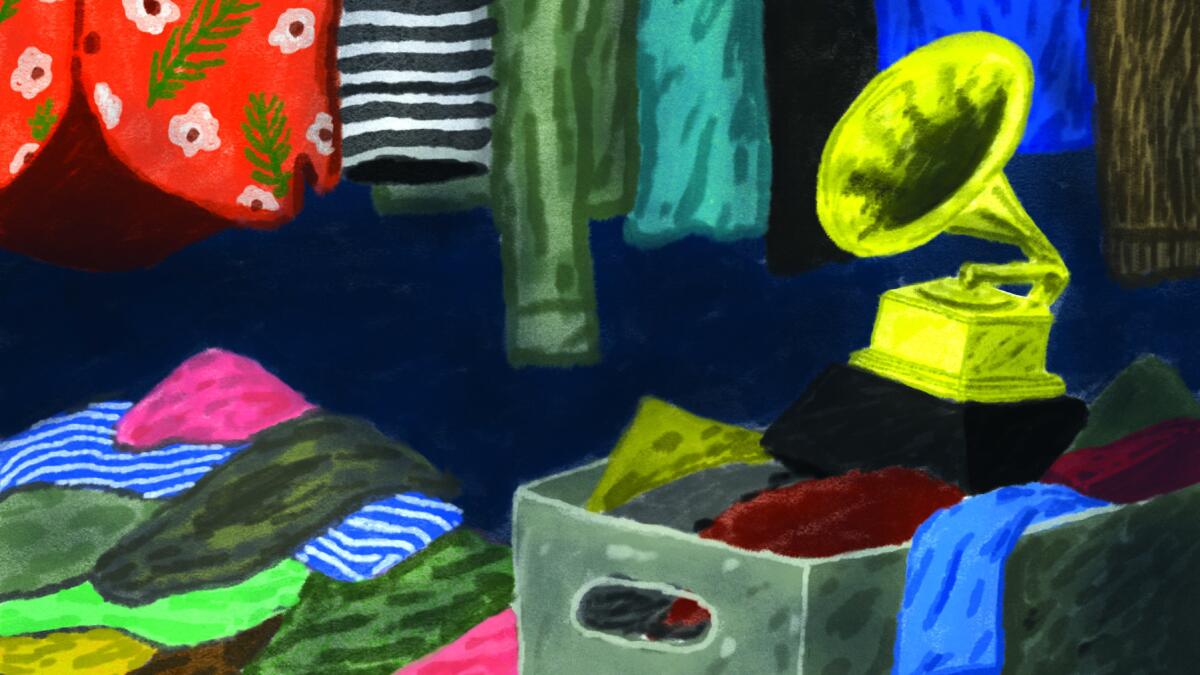L.A. Affairs: I was dating a Grammy winner. And I felt like a failure

- Share via
We stumbled into his house around midnight, giddy from the cold-for-Los Angeles air.
“Do you want a whiskey?”
“Yes.”
I heard him drop an ice cube in each glass and the short pour and then he paused in the doorway between the kitchen and living room, holding a glass in each hand. He looked at me inquisitively. “Do you …,” he began a little hesitantly, “ … want to see my Grammy?”
“Are you kidding? Yes, of course!” I gushed, trying to sound enthusiastic.
Not that I wasn’t enthusiastic.
I was, however, a little conflicted.
Dating a Grammy-winner can be very flattering to your ego. Having a romantic pull on someone at that level of success can have you believing that you must be quite a catch. You quietly hope that maybe their success is a reflection of your own worth. But for me, that delusion was fleeting. It was quickly replaced with something more complicated. Somewhere during the five months that we’d been dating, M’s Grammy for his work as a recording engineer had begun to haunt me.
I followed him into his bedroom.
He opened up his closet door and dug the trophy out from behind some laundry at the back of the closet. He handed it to me. “Wow, it really is heavy!” I found myself saying, as if reading off some script about holding trophies. “I can’t believe you’ve never shown this to me before!” “Yeah, well, it’s not really that important.”
We sat on the bed. M said, “I forgot to ask you — did you get a callback for the Subway audition?” He looked at me hopefully, expectantly. Ugh. “No,” I said.
Unlike M, I didn’t work in the music industry, but I was pursuing another L.A.-centric career: acting. My career had been pretty limited, though: a string of short films, a few lines in a made-for-TV movie and a handful of commercials. The majority of my auditions fell into the commercial arena, a skill that hardly qualifies as acting.
But mostly, I waited tables.
I took a gulp. “Great whiskey!” I exclaimed. I was buying time. I could already feel a hot blush washing over my face, betraying my self-consciousness and embarrassment. What had been a steady stream of auditions at the beginning of our relationship had slowed to a small trickle in the last couple of months. Worse, I hadn’t booked in a year. I was feeling increasingly insecure.
M’s career was on the rise. Mine was on a steady downswing.
Before dating M, I’d already had a complicated relationship with the idea of success. For me, the word “success” automatically conjured up monetary wealth, fame, academic achievement and significant cultural contributions — all this despite an inner voice that rebelled against these traditional notions of success. This uneasy relationship with success began early, in the eighth grade. It was 1996 and I found myself in a situation with my brother, Max, that was not too dissimilar to my situation with M.
Max was a senior in high school, and like M, he was on the upswing. And I was on the downswing. Although we lived under the same roof, that year could not have been more different for each of us. Max had fully assumed legend status at Lakewood High School.
I, on the other hand, had been ushered into the first of what were to be many experiences of clinical major depression. My brother’s room was a place to store his homecoming king crown and college admissions letters. My room was a place to hide knives I sometimes imagined using on my wrists.
The pain of comparison lingered. I felt that same familiar sting in my heart as M asked about my auditions — bookended, as it was, by holding his Grammy for the first time. Once again, I was confronted with the feeling of being eclipsed by the success of someone I felt very close to.
Sitting there on the bed, I so badly wanted to make him understand. To explain all these things to him. But I feared his pity. I was lucky, though. M was persistent.
I began to open up about the struggles I’d had. He treated them as triumphs. I began to tell him stories about all the non-famous people I worked with at the restaurant — the capricious busboy, the demanding customers. He greeted each story with curiosity and delight.
M thought I was funny. M looked at me from across a room in a way that made me feel like the queen of the prom. I began to let down my guard. The insecurity caused by his career accomplishments began to cast a shorter shadow. I was able to love him with more honesty and less fear.
And I began to see that my idea of success, the one I harbored in my heart, the one that had less to do with money or fame, and more to do with the way you choose to play the hand life deals you, matched up pretty perfectly with the idea of success that he harbored in his heart too.
After all, M keeps his Grammy in the back of his closet.
The author has still not won any major awards but can be found contentedly living in L.A. at Instagram.com/annaaanderson.
L.A. Affairs chronicles the dating scene in and around Los Angeles. If you have comments or a true story to tell, email us at LAAffairs@latimes.com.


